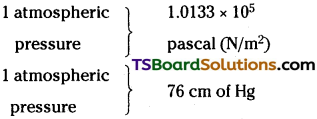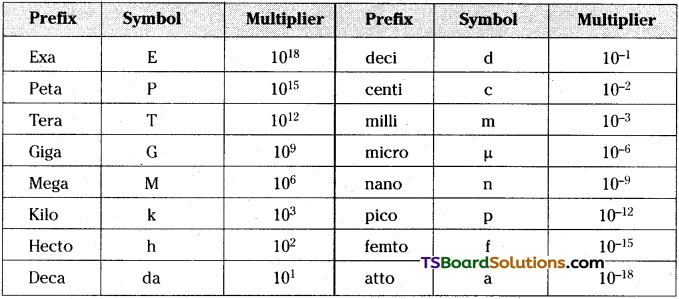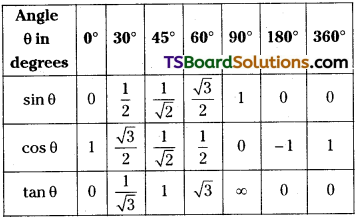Telangana TSBIE TS Inter 1st Year Physics Study Material 1st Lesson Physical World Textbook Questions and Answers.
TS Inter 1st Year Physics Study Material 1st Lesson Physical World
Very Short Answer Type Questions
Question 1.
What is Physics? [TS Mar. ’16]
Answer:
Physics is a branch of science which deals with the study of nature and natural phenomena.
Question 2.
What is the discovery of C.V. Raman? [AP Mar. ’18, 14; May 18, 16, 14; TS Mar. ’19, ’18, ’17]
Answer:
C.V. Raman’s contribution to physics is Raman effect. It deals with scattering of light by molecules of a medium when they are excited to vibrational energy levels.
Question 3.
What are the fundamental forces in nature? [TS May ’18]
Answer:
There are four fundamental forces in nature that govern the diverse phenomena of the macroscopic and the microscopic wu.m. These are the ‘gravitational force’, the ‘electromagnetic force’, the ‘strong nuclear force’, and the ‘weak nuclear force’.
Question 4.
Which of the following has symr etry?
a) Acceleration due to gravity.
b) Law of gravitation.
Answer:
Acceleration due to gravity varies from place to place. So it has no symmetry.
Law of gravitation has symmetry, because it does not depend on any physical quantity.
Question 5.
What is the contribution of S. Chandra Sekhar to Physics?
Answer:
S. Chandra Sekhar discovered the structure and evolution of stars. He defined “Chandra Sekhar limit” which is used in the study of black holes.
![]()
Question 6.
What is beta (β) decay? Which force is a function of it?
Answer:
In β-decay the nucleus emits an electron and an uncharged particle called neutrino.
β – decay is due to weak nuclear forces.
❖ Some physicists and their major contributions
| Name | Major contribution/ Discovery |
| 1. Archimedes | Principle of buoyancy, Principle of the lever |
| 2. Galileo Galilei | Law of inertia |
| 3. Isaac Newton | Universal law of gravitation; Laws of motion, Corpuscular theory of light; Reflecting telescope. |
| 4. C.V.Raman | Inelastic scattering of light by molecules. |
| 5. Edwin Hubble | Expanding universe |
| 6. Hideki Yukawa | Theory of nuclear forces |
| 7. S. Chandrasekhar | Chandrasekhar limit, structure and evolution of stars |
| 8. Michael Faraday | Electromagnetic induction laws |
| 9. James Clark Maxwell | Electromagnetic theory – light – electromagnetic waves |
| 10. J.J.Thomson | Electron |
| 11. Albert Einstein | Explanation of photoelectric effect and theory of relativity |
| 12. R.A.Millikan | Measurement of charge of electron. |
| 13. Ernest Rutherford | Nuclear model of atom |
| 14. John Bardeen | Transistors; Theory of super conductivity. |
![]()
❖ Fundamental forces of nature
| Name | Relative strength (N) |
| 1. Gravitational force | 10-39 |
| 2. Weak nuclear forces | 10-13 |
| 3. Electromagnetic forces | 10-2 |
| 4. Strong nuclear forces | 1 |
❖ Fundamental constants of Physics
| Physical constant | Symbol | Value |
| 1. Speed of light in vacuum | C | 3 × 108 meter/sec |
| 2. Planck’s constant | h | 6.63 × 10-34 joule.sec |
| 3. Molar gas constant | R | 8.31 joule/mole.K |
| 4. Avogadro’s number | NA | 6.02 × 1023/ mol |
| 5. Boltzmann’s constant | K | 1.38 × 10-23/mol |
| 6. Gravitational constant | G | 6.67 10-11 Newton.m2/kg2 |
| 7. Mechanical equivalent of heat | J | 4.185 joule/cal. |
| 8. Triple point of water | Ttr | 273.16 K |
| 9. Density of water at 20° C | dω | 103kg/m3 |
| 10. Density of mercury | dm | 13.6 × 103 kg/m3 |
| 11. Density of dry air at N.T.P. | da | 1.293 kg /m3 |
| 12. Specific heat of water | sω | 1 cal./gm/°C |
| 13. Latent heat of ice | Lf | 80 cal./gm |
| 14. Latent heat of steam | Lυ | 540 cal/gm (or 539) |
| 15. √5 = 2.236, √3 = 1-732, √10 = 3.162, loge 10 = 2.3026 | ||
| 16. π = 3.14, π2 = 9.87, √π = 1.7772, √2 = 1.414 | ||
![]()
❖ Conversion factors:
1 metre – 100 cm
1 millimeter – 10-3m
1 inch – 2.54 × 10-2m
1 micron (µ) – 10-4cm
1 Angstrom (A°) – 10-8cm
1 fermi (f) – 10-13 cm
1 kilometer – 10³ m
1 light year – 9.46 × 1015 m
1 litre – 10³cm³
1 kilogram – 1000 gm
1 metricton – 1000 kg
1 pound – 453.6 gm
1 atomic mass
unit (a.m.u) 1.66 × 10-27 kg
1 a.m.u – 931 MeV
1 day – 8.640 × 104 seconds
1 km/hour – \(\frac{5}{18}\) m/sec (or)
0.2778 meter/sec.
1 Newton – 105 dynes
1 gm wt – 980.7 dynes
1 kg.wt – 9.807 Newton
1 Newton/meter² – 1 pascal

1 Pascal – 10 dyne/cm²
1 Joule – 107 erg
1 kilo watt hour – 3.6 × 106 joule
1 electro volt (ev) – 1.602 × 10-19 joule
1 watt – 1 joule / sec
1 horse power (HP) – 746 watt
1 degree (° ) – 60 minute (‘)
1 Radian – 57.3 degree ( ° )
1 Poise – 1 dyne . sec / cm²
1 Poiseuille – 10 poise
(Newton, sec/m² (or) Pascal sec.)
❖ Important Prefixes:

❖ The Greek Alphabet:

❖ Formulae of geometry :
1. Area of triangle = \(\frac{1}{2}\) × base × height
2. Area of parallelogram = base × height
3. Area of square = (length of one side)²
4. Area of rectangle = length × breadth
5. Area of circle = πr² (r = radius of circle)
6. Surface area of sphere = 4πr² (r = radius of sphere)
7. Volume of cube = (length of one side of cube)³
8. Volume of parallelopiped = length × breadth × height
9. Volume of cylinder = πr²l
10. Volume of sphere = \(\frac{4}{3}\)πr³
Circumference of square = 4l
11. Volume of cone = \(\frac{1}{3}\) πr²h
12. Circumference of circle = 2πr
![]()
❖ Formulae of algebra:
(a + b)² = a² + b² + 2ab
(a – b)² = a² + b² – 2ab
(a² – b²) = (a + b) (a – b)
(a + b)³ = a³ + b³ + 3ab (a + b)
(a – b)³ = a³ – b³ – 3ab (a – b)
(a + b)² – (a – b)² = 4ab
(a + b)² + (a – b)² = 2(a² + b²)
❖ Formulae of differentiation:
1. \(\frac{d}{dx}\) (constant) = 0
differentiation with respect to x = \(\frac{d}{dx}\)
2. \(\frac{d}{dx}\) (xn) = n xn – 1
3. \(\frac{d}{dx}\) (sin x) = cos x
4. \(\frac{d}{dx}\) (cos x) = – sin x dx
❖ Formulae of Integration:
Integration with respect to x = ∫dx
1. ∫dx = x
2. ∫xn dx = r n + 1
3. ∫sin x dx = cos x + c
4. ∫cos x dx = sin x + c
❖ Formulae of logarithm :
1. log mn = (log m + log n)
2. log\(\frac{m}{n}\) = (log m – log n)
3. log mn = n log m
❖ Value of trigonometric functions :

![]()
❖ Signs of trigonometrical ratios :
sin (90° – θ) = cos θ ; sin (180° – θ) = sin θ
cos (90° – θ) = sin θ ; cos (180° – θ) = – cos θ
tan (90° – θ) = cot θ ; tan (180° – θ) = – tan θ
❖ According to Binomial theorem :
(1 + x)n ≈ (1 + nx) if x < < 1
❖ Quadratic equation:
ax² + bx + c = 0
